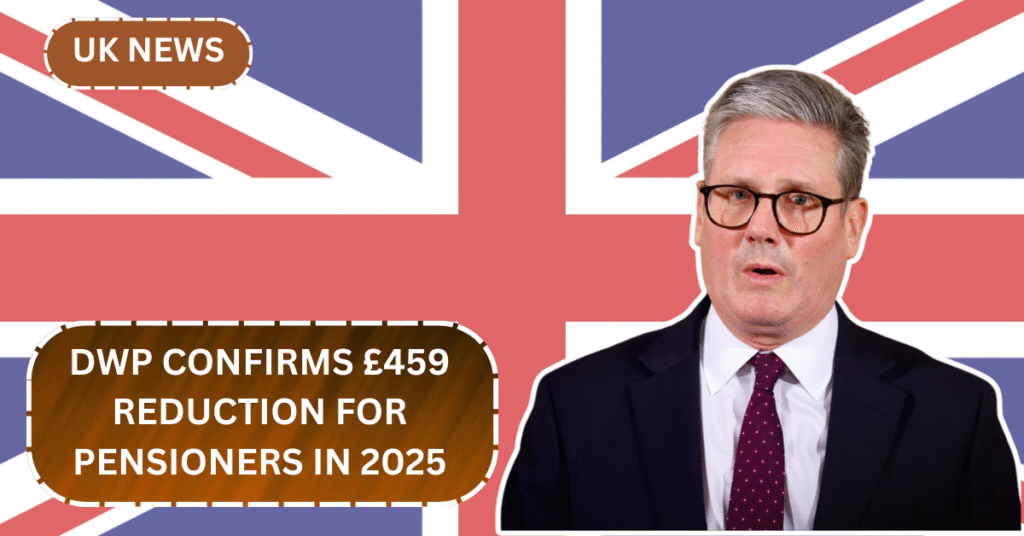Department for Work and Pensions (DWP) has revealed that pensioners could face a significant reduction of £459 in their state pension payments in 2025 due to rising inflation. This reduction could have a substantial impact on the financial stability of millions of pensioners across the UK. As inflation continues to rise, concerns grow about the sustainability of pension funds and the future of pensioners who depend heavily on these payments for their day-to-day expenses.
The Impact of Inflation on State Pensions
This Article Includes
Pensioners are particularly vulnerable to inflation, which erodes the purchasing power of their fixed incomes. According to the DWP, inflation has surged at a rate higher than expected, and with no immediate relief in sight, the gap between pension payments and the cost of living is widening. For many pensioners, the cost of essential goods such as food, energy, and healthcare is rapidly increasing, making it harder to make ends meet.
The £459 reduction in the state pension is not just a figure—it represents the gap between what pensioners need and what they will receive in 2025. For the elderly, who are often unable to work or supplement their income, this reduction could mean difficult decisions about which bills to pay, or even going without essentials.
What is Driving Inflation?
Inflation is largely being driven by rising energy costs, food prices, and housing expenses. The global supply chain disruptions caused by the pandemic, combined with geopolitical tensions, have resulted in significant price hikes in basic necessities. The Bank of England has been trying to control inflation by raising interest rates, but the effects are not immediate, and many are still feeling the pinch.
In addition to these economic factors, the weakening pound has made imported goods more expensive, further exacerbating inflation. The DWP’s warning comes as many pensioners are already struggling with the increased cost of living, and now the reduction in their state pensions will add additional financial stress.
What Does This Mean for Pensioners?
For pensioners, a reduction in state pension payments means that their fixed income will not stretch as far as it used to. Many elderly people live on tight budgets, and they have limited options for adjusting their financial situation. As the cost of living continues to climb, pensioners will likely have to make even tougher choices, such as cutting back on essential items like food, heating, and medical care.
This reduction is particularly concerning for those who do not have private pensions or other sources of income. With the state pension serving as the primary source of income for many older people, this £459 cut could be a blow to their financial well-being, leaving them in a much more precarious situation.
DWP’s Response to the Crisis
The Department for Work and Pensions has acknowledged the difficulties faced by pensioners due to inflation. In response, they are exploring options to mitigate the impact of these cuts. However, there are no immediate solutions, and pensioners are left to deal with the reality of a smaller state pension payout in the coming years.
The DWP has emphasized that the government is committed to reviewing the state pension system regularly to ensure that it remains fair and sustainable. But the question remains—how much longer will pensioners have to wait for significant changes that will truly benefit them in times of financial hardship?
Possible Alternatives for Pensioners
While the reduction in state pensions is difficult to avoid, there are a few steps pensioners can take to help soften the blow. Some pensioners may be eligible for additional benefits, such as the Pension Credit, which provides extra financial support to those on low incomes. It’s important for pensioners to explore these options and check if they qualify for any government assistance.
Moreover, community-based initiatives, such as food banks and financial advisory services, can provide much-needed support. Pensioners can also consider downsizing their living arrangements if possible, as housing costs tend to consume a large portion of their budgets.
Conclusion
The news that pensioners will face a £459 reduction in state pension payments in 2025 is a wake-up call to the ongoing financial strain caused by rising inflation. For many pensioners, this reduction is a stark reminder of the challenges they face in an increasingly difficult financial landscape. With inflation continuing to rise, it is essential that both the government and society at large work to find solutions that will protect the well-being of pensioners and ensure that they have a secure and dignified retirement.




